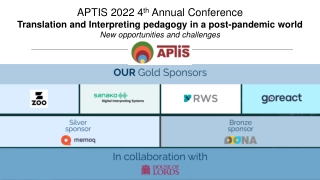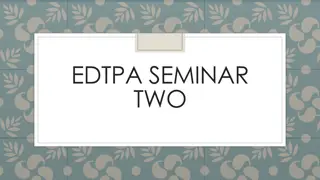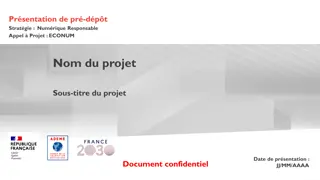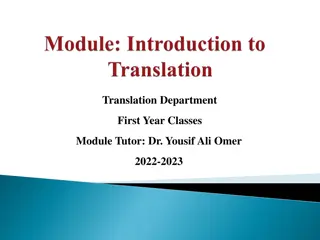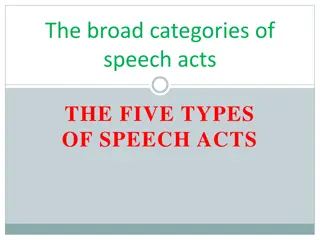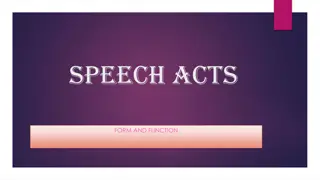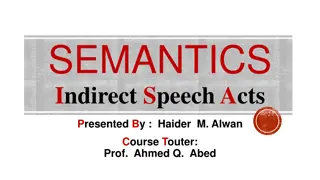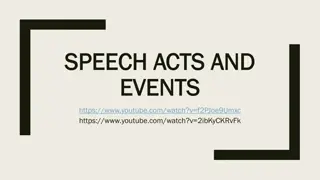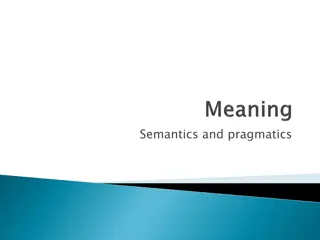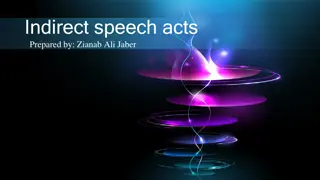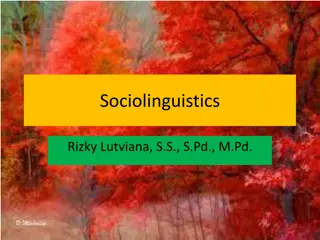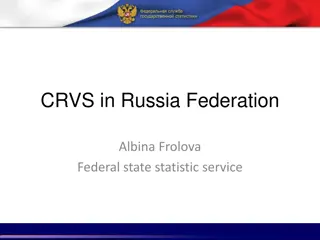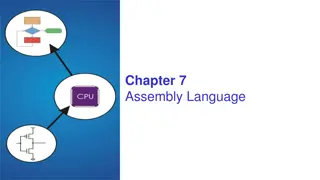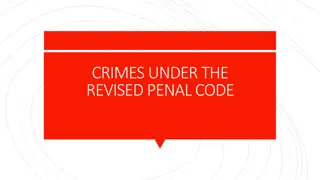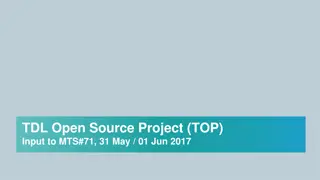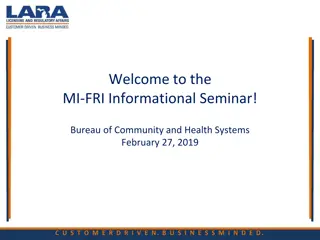Language Acts and Worldmaking Project
Delve into the transformative force of worldmaking through language with the Language Acts and Worldmaking project. Discover how languages shape our perceptions and interactions, enabling us to explore diverse cultural narratives and historical experiences. Uncover the dynamic relationship between language, teaching, and cultural engagement, fostering a deeper understanding of human expression and connection.
Download Presentation

Please find below an Image/Link to download the presentation.
The content on the website is provided AS IS for your information and personal use only. It may not be sold, licensed, or shared on other websites without obtaining consent from the author.If you encounter any issues during the download, it is possible that the publisher has removed the file from their server.
You are allowed to download the files provided on this website for personal or commercial use, subject to the condition that they are used lawfully. All files are the property of their respective owners.
The content on the website is provided AS IS for your information and personal use only. It may not be sold, licensed, or shared on other websites without obtaining consent from the author.
E N D
Presentation Transcript
Language Acts Project See Leaflet Handout Six Research Strands: how we learn languages, teach languages, engage with our own culture and the cultures of others through languages Travelling Concepts - Words in Action Translation Acts Worldmaking on Stage Diasporic Identities and the Politics of Language Teaching Teaching Languages, Mediating Cultures Loaded Meanings New Worlds for Old Words Digital Mediations Mapping Multilingualism and Digital Cultures Language Transitions Moving Through Languages
What do we mean by Worldmaking ? The concept of worldmaking as a transformative force allows us to articulate the materiality and historicity of language as at the core of human experience. In other words .. How the languages we use affect how we think and feel about ourselves, about other people, and about the world around us How do languages work in the world? Not only language teaching and language acquisition, but the way we think through and in a language, and are shaped by it
What do we mean by Worldmaking ? The Language Acts and Worldmaking project follows principles and concepts contained in Goodman s (1978) Ways of Worldmaking .The basic tenet of Goodman s relativism is that far from assuming there is a single truth, a fixed world to be found, there is a diversity of right and even conflicting versions of worlds in the making (Goodman, 1978, Foreword, p. x) Project expands these ideas; Emphasis on processes of worldmaking
What do we mean by Worldmaking ? More pragmatically . Engagement with communities of language learners and teachers, and of users of many different languages Construct a narrative about the need to research and teach from the early-modern to the contemporary period, bringing together different approaches to illustrate how living languages derive from historical lived experiences with contemporary impact today
Aims of Language Acts and Worldmaking Demonstrate how Modern Languages research illuminates the relationship between Language and Worldmaking Guiding Principle: Worldmaking is a dynamic, material, collective human activity where language holds the key to action and transformation (i.e. language at the heart of everything we do) Approach to research fostered by Language Acts and Worldmaking has at its heart the understanding of our practice as embodied experience made explicit in the role of the teacher and of the learner of any language
Aims of Language Acts and Worldmaking Historical research distinguishes our project Academic research and research led by practice Space for experimentation in teaching and learning (curiosity, creativity and playfulness; allow to fail ) Creation of co-researchers Curriculum Innovation to regenerate and transform Modern Languages Shared practice and research to and from primary to HE A narrative for working with IWLPs to provide cohesive and integrated language learning
How does Language Acts do this? The Work of the Research Strands Portfolio of Research in literary and cultural studies, translation, linguistics, pedagogy, digital humanities Indicative publications and outputs peer-reviewed articles; collective volumes; reports to inform the discipline, institutional and policy strategies; play readings and performances of theatre and poetry; community events; conferences; symposia; on-line resources with the OU s Open World Create; debates
How does Language Acts do this? Examples of landscaping Reports: Diasporic Identities and the Politics of Language Teaching with University Council of Modern Languages (UCML) and Association of University Language Communities (AULC): Language Provision in UK MFL Departments Survey 2018 Digital Mediations: Attitudes towards Digital Culture and Technology in Modern Languages (2019) Working towards further debates; archive of history and trends in ML education; activism To come: Survey of attitudes towards Modern Languages amongst postgraduate taught and research students; Evaluation of Primary provision and transition (case study of Hackney); Position Paper Worldmaking as a Way of Transforming (Modern) Languages in the UK; collective volumes Language Acts and Worldmaking; Tackling severe grading
Some Examples of the work of Language Acts June 2018 Languages Memory Conference; inspired by concern about the fractured history of language policy in the UK and the need to remember and understand how languages are experienced, practised, taught and researched now and in the past Many participants from the cultural sector who helped identify key areas for transformative impact: cross- cultural awareness; curriculum change; inclusion and diversity; integrated and coherent policies for ML teaching Living archive of resources and reference materials
Some Examples of the work of Language Acts Language Debates Series: Language Education Activism Modern Languages A Discipline (Still?) In Search of an Identity Should Second Language Acquisition and Language Teaching Be Aligned and How? Has the Digital World Revolutionised Language Pedagogy? Interculturality and Creativity in Language Education Communicating Emotions in a Foreign Language Gender Action: Gender and Modern Languages in Schools Debating Collaboration in Languages in Higher Education: Towards New Models? The Linguistics in Modern Foreign Languages in Schools Project To come: The relationship between language and cultural content teaching Tackling the severe grading issue
Some Examples of the work of Language Acts Diasporic Identities Strand, Counterpoint Arts and the Open University: Worldmaking Threads (May 2018) Participatory installation/workshop at Tate Modern, combining arts, crafts and languages. Showcased language teachers as creative meditators between languages and cultures Reaching over 5, 000 members of the public, engaging 30 language teachers, 20 embroiderers, 2 artists Created a Coat and Headwrap featuring 120 sayings in 15 languages and 19 short films
Curriculum Innovation Four Curriculum Innovation Awards from King s; funds to trial innovative pedagogic models New approaches to interdisciplinary research and teaching and delivering service-led teaching Developing thinking around digital methods in ML research (Art and Activism in the Digital Age) Language Acts and Worldmaking Laboratories (e.g. language learning and higher order literacy; communication across borders; narrative and voice; being human in the digital age) Working with local communities from the perspective of a language students (Loneliness in older adults, across cultures and languages; with Psychiatry, Psychology and Neuroscience) Tackling disciplinary gender bias/gendering of language learning (Gender Action; with Physics)
New Collaborations, New Ideas . Organic evolution of the project: memory (archives), present activities (policies) and future (legacy) Flexible Funding and the Small Grants Scheme 3 Calls for proposals: May 2018 Languages Memory; January and June 2019 Integration and Inclusion; 98 projects funded Expanded research community and brought our research into the public sphere Meet project objectives while offering new ideas and challenges enhancing inclusion and diversity in language teaching and learning, identifying emerging research fields and new communities of study/create new links Articulate our own position in the field Value and enable the eccentric in a time of increasing conformity
Worldmaking Live June 3rd2019, Bush House, King s College London Centrepiece of our Worldmaking Fair, Languages Now, May-September 2019 (and see leaflet) Engage wide variety of audiences in a range of venues/enhance co- researchers/audiences/broaden impact Opportunity for small-grant holders to share their work: posters, films, soundscape, performance . Create links between people and organisation that did not previously exist
Small Grant Highlights Global Voices (led by Lora Krasteva), an intercultural and multilingual theatre company, put on three events with the support of Language Acts, Global Queer Voices, Global Arab Feminist Voices and Global Black Voices. The company was reviewed in The Stage and has now become an associated artist at the Roundhouse Theatre, London Organised by Dr Frances Kane, the Know Your Place, Show Your Place project is bringing school children in Northern Ireland together to learn about the history of place names. It has received interest and is welcoming contributions from the Republic of Ireland too https://placenamesni.wordpress.com/ In November, Dr Olumide Adisa of the University of Suffolk is holding an event for multilingual refugees and migrants to discuss domestic abuse in migrant communities. It is her first grant and she could not hold the event without it Increased connections with centres of languages activity, such as the Depts at Cardiff University, Lancaster University, and in Edinburgh, Edinburgh Napier University, with both Dr Mabel Victoria running a project of Enhancing intercultural understanding, integration and inclusion through the arts , and Dr Sylvain Blanche running a mentoring and outreach project via Worldwide Napier, ENU s magazine designed by its languages students to encourage languages study https://issuu.com/worldwidenapier
Project enables ways of delivering Integrated models for language learning from primary school through to HE level/policy and continuous language- learning experience Models that valorise all contributions to the teaching of languages/collective practice Research produced through the study of language as a complex and perpetual worldmaking activity Languages as something we can become rather than something we do New and different roles for the language learner and for the language educator in society The work that languages do and need to do in the world
Languages Future Conference 27thand 28thApril 2020; King s College London Call for Papers imminent; proposals deadline 20thDecember 2019 Consider how our work in languages and worldmaking is intervening in the debates of our time Lay foundations for future language learners, researchers and activists Leave behind our timidity about the work languages do and need to do in the world Idealism for schools, university students, youth and community groups: How will the study of languages make the world a better place ? Ways of Worldmaking Dilemmas: for example, languages in times of crisis; working with the multilingual in the monolingual, tackling exclusivity in language learning


